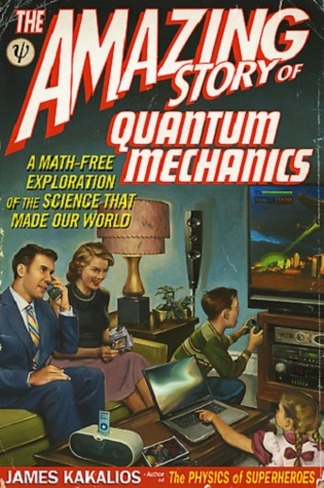| Date Read: May 29th, 2021 Final Score: 9 / 10 ! | Well. The subtitle lied. This is NOT a 'math-free' exploration. But that was obvious going in, largely because Math is the language by which we consolidate descriptors of observable and calculable phenomena. Math isn't magic that controls the universe, it simply reduces the description of what's already happening down to its core components. Like taking all the nebulous adjectives out of a sentence, instead of saying 'this thing is moving quickly', it defines both the thing and the speed its moving relative to what it's moving more quickly than. This book while not genuinely 'math-free' does go to great lengths to elaborate on how math as a concept is really more akin to a very specific, very concrete linguistic construction than it is to a magic number-thingy. The most fascinating aspect of this book, from my perspective as a tech-savvy Millennial who wasn't born in an era before Quantum Mechanics had already become an accepted part of Science to the point that it had trickled out into commercial markets, was the illuminating comment on what schism of understanding left futurist thinkers of sci-fi tech in the 50's & 60's (and even in the 70's & 80's) swinging so wildly off-base in their projections of 21st century tech... |
- The problem that scientists and futurists were focused on back then was the efficient production, storage, and transfer of Energy.
- The solution that we found to catapult ourselves into a digital age was one of efficient storage, transfer, and reproduction of Information.
The advent of transistors made power usage slightly more effective, but it changed everything in terms data movement and processing. I'd known that on a logical level, but I hadn't quite realized how focused the previous generation's gaze was on energy-related tech-developments until Kakalios linked aspects of futurist projections to both the cutting edge of 50's science culture, and to the pop-culture creations that came out of each new 50's science revelation. (I always knew it made sense to them, but this IS the generation who flung 3 people at the moon in a gold-covered toaster with less digital processing power than the watch I had in middle school, soooooo... 'sense' has always been something I took with a few hearty grains of salt).
Kakalios breaks everything down into understandable, bite-sized pieces, relates those pieces to both a pop-culture event and a scientific development, explains the math that describes the concept, and creates a coherent, over-arching narrative about how these concepts have both literally built and conceptually inspired our modern world.
Overall, it's an extremely well done, fantastically well researched, and deeply informative pieces of physics non-fiction that was also delightfully entertaining.
Now, I may be biased towards favoring it because I am the super geek that was glued to the History Channel and the Science Channel, watching Michio Kaku and Brian Greene discuss the physics of the impossible and taking viewers on a tour of the universe instead of watching Spongebob (which I STILL don't understand the appeal of) or whatever else was on Nickelodeon, but that doesn't really mean I had too much of a leg up in the science-understanding aspect, here. The thing about Quantum Mechanics, and about math & modern physics in general, is that it's NOT easily observable, relatable stuff. In the same way as being given a random chapter in a book is not really going to illuminate the story for you, even if its a book you've read before, unless you're VERY familiar with the context, you'll need a little help exploring it.
While I have read the metaphorical 'Quantum Mechanics book' before, but like only once and way back in high school, so I can be pretty confident in saying that anyone totally unfamiliar with the topic will still get a huge boost of in-depth understanding out of this.
I HIGHLY recommend it! Kakalios truly presents a FANTASTIC in-roads to this entire realm of study!
(And, of course, I also recommend that everyone explore a little of the Quantum Physics realm, simply because of how critically important it is to the making and maintenance of our modern world!)

 RSS Feed
RSS Feed
